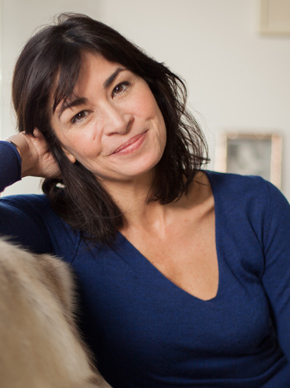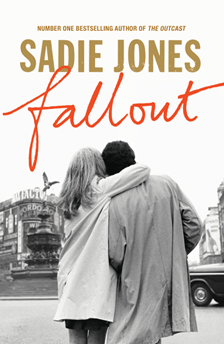Straight-talking Sadie Jones
by Alex Peake-TomkinsonThere is no doubt that Sadie Jones is a generous-spirited woman. I get lost on my way to her house in Chiswick but when I arrive, flustered, instead of being cross that I’ve kept her waiting, she sweetly asks what kind of coffee I’d like, pointing at a complicated-looking machine. Coffee made, we settle down on her sofa and talk about her latest – and in my opinion best – novel, Fallout. It centres on a quartet of young people in 1970s theatreland who may, or may not, be able to save one another. When I mention how much I hate one of her creations, producer Tony Moore, who sadistically abuses his wife, Jones says “I really like him! He’s also a masochist, he’s making himself unhappy. I think he’s very sad, I just pity him. I think he loves her and wants what’s best for her. Wouldn’t it be horrible to be so eaten up by cruelty, by wanting to squash people and get ahead? I mean, he’s a tragic person.”
Jones skilfully manipulates the reader’s sympathy for his wife, a young actress called Nina. She asks me when the switch in my sympathy took place, anxious that she got this right. I mumble a bit and then she says “It’s the blowjob, isn’t it?” I’m slightly taken aback because although this is true, Jones writes so well about sex that this prosaic description doesn’t seem to cover what happens. There is quite a lot of sex in the book though, isn’t there? “I really like writing sex… or, it doesn’t bother me. I don’t approach it thinking ‘this is a sex scene’. It’s just that how can you possibly write about intimacy or love or sex or men and women if you’re skipping that bit because that’s what you do, it’s so essential. I have quite a high, or low, cringe threshold. There are certain words or descriptions that make me want to die if I hear them. I just write it and I don’t feel inhibited. I don’t worry about it but there are certainly things that I would never put.”
Like?
“So many! Let me think. I would never have any nipples. The word nipple is just no good unless you want ickiness… I’m just trying to convey the experience, I’m not trying to be sexy or anything. I’m just trying to be truthfully there. And then, it’s quite funny when people say there’s quite a lot of sex in it. And I think a little goes a long way, as with anything very intense.”
It’s the same with the main character’s self-harm in her first novel The Outcast, she explains: “People often, or occasionally talk about all those long intimate descriptions of him cutting himself and if you look at it, there’s hardly any at all. I think that anything that’s either very difficult to read or very intense to read you kind of have to respect the weight of it on the page so I always try not to have too much fun with it or to take too much time with it. In another way, I think you need to trust the reader to fill in the gaps… with sex, or personal pain, or grief or violence, or things that are very threatening to us… What I try to do is be as truthful as I can about them and not layer it on. As a reader, I don’t like to have that sort of relentless detail of a thing rammed into me. I want to be glimpsing it and then go there, that’s a deeper experience as a reader, to be invited in and not protecting myself against the writing.”
I ask if she edits herself ruthlessly and surprisingly, she says “If it’s a difficult thing, I write with my eyes closed.” It turns out that she learnt to touch type on a secretarial course and she says of typing with her eyes closed, “it’s really useful because then you don’t have that inner critic.”
Did she research the self-harm in The Outcast?
“No, I didn’t research that book at all and then when I’d written it, I thought ‘Shit, I’ve written this sort of issues book!’ So I did some sort of retrospective check-ups. I checked the 50s stuff with my mum and looked up car models but I didn’t before writing it because it just had its own world.”
Jones says of the main character, Lewis and his self-harm, “Oh I just knew him, he was just there. I never questioned it at all but it was quite unnerving because when it came out, people were saying ‘Boys don’t do that’ and I just knew that he had. I hadn’t looked it up. And then I was in Canada and a journalist who had worked in prisons said to me that 70 per cent of the boys at least were harming themselves, that the whole prison tattoo thing was a way of harming yourself. It was a sort of a huge vindication. People before that would say it was a sort of 80s teenage girl thing to do!
“It was deeply rooted in the Christ myth as well and that self-punishing thing that’s so deeply rooted in Christianity, that he’s this sort of martyred creature, you know, that we all turn our suffering on ourselves?” Lewis’s family reacts badly to his behaviour, wanting to shun him, and she says, “There’s always a lot of rage against his father but I think he’s doing his best, he’s been in the War, it was a generation of people recovering from a global crisis and it was not easy. I wanted to show us ourselves and that we find damaged children repellent. I’ve found this as a mother. You like to think you would be the one who says ‘Oh look at this poor creature’ but actually when your child brings home someone of 4 or 6 or 8 or 14 who is damaged or having a bad time, your animal instinct is to shut them out of the house and it’s shaming but they act out and are a bad influence and you’re trying to keep your child safe. And children do that blank thing, think of all the horror movies about children, they don’t say ‘I’m feeling like this, I need some help’, they just get that blank look and it’s scary so I’ve always very much understood people’s response to this.”
I feel a certain pressure, I don’t know whether it’s from the world or whether it’s from myself, to write heroines and celebrate womanhood, and I do celebrate womanhood but often women are abused and can’t fight back.”
I mention that Jones seems to empathise with all her characters no matter how badly they behave, and she says of Nina from Fallout, “I loved her really deeply but knowing how women like that mess men up and they do, it was a sort of dual thing. She tries to be brave but it’s not only not in her make up, it’s also not in her experience to rise above it. She’s a victim. There’s that wonderful expression ‘the tyranny of the weak’ and she has that incredible charisma and hold over people, in a way she’s sort of monstrous in her effect on people. I found her sort of tough to write in that way because I was sort of having to write her from the outside, write her effect on people.”
I wonder if Jones thinks Nina has a choice and she surprises me by saying “I don’t think anyone has any choice. You want to forge your path, but how much is it laid down for you? I get exasperated with her, in the way that you want to shout at Othello. She embraces her self-destruction because she won’t fight, she’s a feminine victim. Our modern attitude to women is quite unforgiving in a way. This is a tricky, classic tragic victim woman in a way and I don’t think there are many of those about in modern fiction. I feel a certain pressure, I don’t know whether it’s from the world or whether it’s from myself, to write heroines and celebrate womanhood, and I do celebrate womanhood but often women are abused and can’t fight back.”
Jones has written twice about marital rape, in Small Wars and in Fallout and says “I think we have to examine the strange shades of bullying and self-destruction in abusive relationships, which isn’t to blame the victim but I think it’s more useful to examine the state of mind we get into when we become victims. There’s a certain reductiveness, not that I disagree with it, but if you don’t have any discussions before you get to ‘rape is rape’ and ‘no is no’ then you are almost disempowering people more because you’re taking away from them any element of responsibility. Responsibility is very different from blame.”
The one character who behaves unequivocally badly in Fallout is Nina’s mother, and Jones says she has written monstrous mothers before. I wonder why? “I think that when a mother says a thing to a daughter it’s like a hundred people are saying it… And now I have a teenage daughter and I’m super-careful never to criticise my daughter. It’s a horrible power.”
Jones has mentioned in interviews before that she felt a bad example to her daughter before she became a novelist because she was professionally unfulfilled and she says, “We always feel guilty as parents, always, always. But I think watching your parent be unfulfilled has got to be a really powerfully bad thing to grow up with, hasn’t it? I think seeing them not be themselves… and I was thwarted in not being myself simply because… not when I was writing, but when I was recovering from disappointments or being blocked or waiting six weeks for someone to read something. Then you’re in a lockdown, you’re not able to be a good example, to be bold, to be free.”
The Outcast was published when she was 40, after numerous disappointments. I ask her why she kept going. “I couldn’t not do it. Writers are really self-pitying… it’s not as though I was turning out these works of genius, but I’d just have another idea and that would keep me going. And I’m happy whilst I’m doing it. I love it. It has to be really uncomfortable, I have to be failing at something that’s better than me. I’m happy in the rest of my life when I’m writing. I get up from my desk and getting the food in, talking to people, it is what it is instead of being… intolerable.”
I’m having such a nice time sat on Sadie Jones’ sofa that I find it hard to stop laughing at her description of reality as ‘intolerable’ but she gamely explains, “There’s just this world, isn’t there and that’s just not okay I suppose,” she laughs and then says, quite seriously “but if I’ve got the other thing, this other world, this other place, then reality all becomes fine.”
Sadie Jones’s debut novel The Outcast won the Costa First Novel Award, was shortlisted for the Orange Prize and became a Richard and Judy Summer Reads number one bestseller. Her subsequent novels Small Wars, The Uninvited Guests and now Fallout have each been roundly praised. Fallout is published by Chatto & Windus in hardback, eBook and audio download, and was read on BBC Radio 4’s Book at Bedtime. Her earlier novels are all published by Vintage. Read more.
Alex Peake-Tomkinson is a contributing editor at Bookanista and writes book reviews and features for the Mail on Sunday, the TLS and the Daily Telegraph.
@AlexPeakeTom



